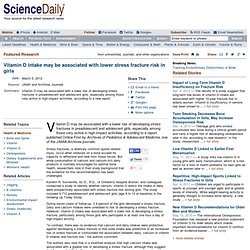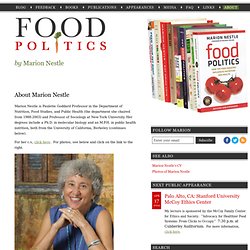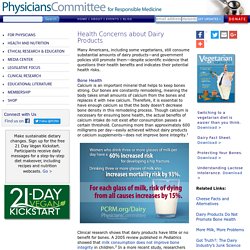

Vitamin D intake may be associated with lower stress fracture risk in girls. Vitamin D may be associated with a lower risk of developing stress fractures in preadolescent and adolescent girls, especially among those very active in high-impact activities, according to a report published Online First by Archives of Pediatrics & Adolescent Medicine, one of the JAMA/Archives journals.

Stress fractures, a relatively common sports-related injury, occur when stresses on a bone exceed its capacity to withstand and heal from those forces. But while consumption of calcium and calcium-rich dairy products is routinely encouraged for optimal bone health, researchers note in their study background that the evidence for this recommendation has been challenged. Kendrin R. Sonneville, Sc.D., R.D., of Children's Hospital Boston, and colleagues conducted a study to identify whether calcium, vitamin D and/or the intake of dairy were prospectively associated with stress fracture risk among girls. During seven years of follow-up, 3.9 percent of the girls developed a stress fracture. The risk of child and adolescent overweight is relate... [Nutr J. 2011.
A high ratio of dietary animal to vegetable protein increases the rate of bone loss and the risk of fracture in postmenopausal women. © 2001 American Society for Clinical Nutrition Abstract Background: Different sources of dietary protein may have different effects on bone metabolism. Animal foods provide predominantly acid precursors, whereas protein in vegetable foods is accompanied by base precursors not found in animal foods. Imbalance between dietary acid and base precursors leads to a chronic net dietary acid load that may have adverse consequences on bone. Objective: We wanted to test the hypothesis that a high dietary ratio of animal to vegetable foods, quantified by protein content, increases bone loss and the risk of fracture.
Design: This was a prospective cohort study with a mean (±SD) of 7.0 ± 1.5 y of follow-up of 1035 community-dwelling white women aged >65 y. Results: Bone mineral density was not significantly associated with the ratio of animal to vegetable protein intake. Nutrition is an important component of bone health; the value of nutrients such as calcium is well documented (1).
Subjects. Calcium, vitamin D, milk consumption, and hip... [Am J Clin Nutr. 2003. About Marion Nestle. Marion Nestle is Paulette Goddard Professor in the Department of Nutrition, Food Studies, and Public Health (the department she chaired from 1988-2003) and Professor of Sociology at New York University.

Her degrees include a Ph.D. in molecular biology and an M.P.H. in public health nutrition, both from the University of California, Berkeley (continues below). For her c.v., click here. For photos, see below and click on the link to the right. Her first faculty position was in the Department of Biology at Brandeis University. From 1976-86 she was Associate Dean of the University of California San Francisco (UCSF) School of Medicine, where she taught nutrition to medical students, residents, and practicing physicians, and directed a nutrition education center sponsored by the American Cancer Society.
From 1986-88, she was senior nutrition policy advisor in the Department of Health and Human Services and managing editor of the 1988 Surgeon General’s Report on Nutrition and Health. Health Concerns about Dairy Products. Many Americans, including some vegetarians, still consume substantial amounts of dairy products—and government policies still promote them—despite scientific evidence that questions their health benefits and indicates their potential health risks.

Bone Health Calcium is an important mineral that helps to keep bones strong. Our bones are constantly remodeling, meaning the body takes small amounts of calcium from the bones and replaces it with new calcium. Therefore, it is essential to have enough calcium so that the body doesn’t decrease bone density in this remodeling process. Though calcium is necessary for ensuring bone health, the actual benefits of calcium intake do not exist after consumption passes a certain threshold. Clinical research shows that dairy products have little or no benefit for bones.
Individuals often drink milk in order to obtain vitamin D in their diets, unaware that they can receive vitamin D through other sources. Fat Content and Cardiovascular Disease Conclusions.